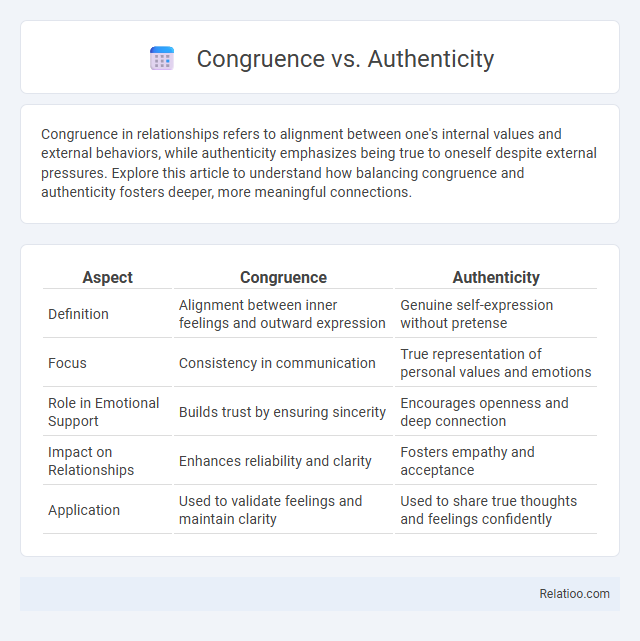Congruence in relationships refers to alignment between one's internal values and external behaviors, while authenticity emphasizes being true to oneself despite external pressures. Explore this article to understand how balancing congruence and authenticity fosters deeper, more meaningful connections.
Table of Comparison
| Aspect | Congruence | Authenticity |
|---|---|---|
| Definition | Alignment between inner feelings and outward expression | Genuine self-expression without pretense |
| Focus | Consistency in communication | True representation of personal values and emotions |
| Role in Emotional Support | Builds trust by ensuring sincerity | Encourages openness and deep connection |
| Impact on Relationships | Enhances reliability and clarity | Fosters empathy and acceptance |
| Application | Used to validate feelings and maintain clarity | Used to share true thoughts and feelings confidently |
Understanding Congruence and Authenticity
Understanding congruence involves aligning your actions, values, and beliefs to create consistency in behavior and communication, which fosters trust and reliability. Authenticity means expressing your true self without pretense, ensuring that your intentions and identity are transparent and genuine. Your ability to balance congruence and authenticity enhances personal integrity and strengthens relationships by promoting clarity and honesty.
The Core Definitions: Congruence vs Authenticity
Congruence refers to the alignment between an individual's inner values, feelings, and outward behavior, ensuring consistency and harmony in self-expression. Authenticity involves being true to oneself by embracing and expressing one's genuine thoughts, emotions, and identity without pretense or external influence. While congruence emphasizes internal-external alignment, authenticity centers on the honest representation of one's core self.
Psychological Foundations of Congruence
Psychological foundations of congruence emphasize alignment between your self-concept and experiences, promoting mental well-being and genuine interactions. Authenticity reflects true self-expression, while congruence specifically highlights consistency between internal values and external behaviors. Understanding these distinctions strengthens emotional resilience and fosters deeper interpersonal connections.
What Does It Mean to Be Authentic?
Being authentic means expressing your true self consistently across thoughts, feelings, and actions, aligning inner values with outward behavior. Authenticity fosters trust and self-respect by eliminating the gap between who you are internally and how you present yourself publicly. This genuine alignment contrasts with mere congruence, which refers to agreement or harmony in various contexts but may not fully capture the depth of personal truth inherent in authenticity.
Congruence in Relationships and Communication
Congruence in relationships and communication refers to the alignment between one's words, feelings, and actions, fostering trust and clarity between individuals. Authenticity involves expressing one's true self without pretense, while congruence ensures this authenticity is consistently reflected through behavior and communication. Maintaining congruence enhances emotional intimacy and reduces misunderstandings, making interactions more meaningful and reliable.
Authenticity: Living True to Yourself
Authenticity means living true to yourself by aligning your actions, values, and beliefs without pretense or compromise. This genuine self-expression fosters deeper connections and personal fulfillment, distinguishing it from congruence, which emphasizes harmony between internal experiences and outward behavior. Embracing your authenticity empowers you to navigate life with integrity and confidence.
Key Differences Between Congruence and Authenticity
Congruence refers to alignment between one's internal values and external behavior, while authenticity emphasizes genuine self-expression without pretense. Key differences between congruence and authenticity lie in congruence focusing on consistency and harmony within oneself, whereas authenticity prioritizes truthfulness and transparency in interactions. Understanding these distinctions aids in fostering self-awareness and effective communication.
Real-Life Examples: Congruence vs Authenticity
Congruence in real-life situations occurs when a person's actions consistently align with their values and beliefs, such as a manager who enforces ethical practices they personally uphold. Authenticity involves expressing one's true self openly, like an artist sharing genuine emotions through their work without pretense. A real-life example contrasting the two is a politician who authentically shares personal stories but lacks congruence when their policies contradict stated values, highlighting the difference between being genuine and acting in harmony with one's principles.
Benefits of Embracing Congruence and Authenticity
Embracing congruence and authenticity fosters genuine self-expression, enhancing your emotional well-being and strengthening relationships by aligning your actions with core values. This alignment reduces internal conflict, boosting confidence and clarity in decision-making. The benefits extend to personal and professional growth, where authenticity cultivates trust and respect from others.
Enhancing Personal Growth Through Self-Awareness
Congruence, authenticity, and self-awareness are interrelated concepts essential for enhancing personal growth by aligning one's values, beliefs, and actions. Congruence involves consistency between internal experiences and external expression, while authenticity emphasizes being true to oneself without external influence. Developing self-awareness facilitates recognizing congruence and authenticity, promoting emotional well-being and fostering deeper personal development.

Infographic: Congruence vs Authenticity
 relatioo.com
relatioo.com